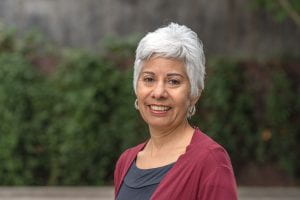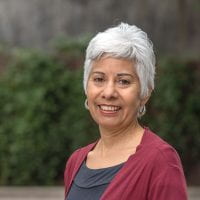Climate deniers are more likely to be Republican and more likely to be white. They are also more likely to have racist beliefs, according to a 2018 study published in the journal Environmental Politics. This correlation is a relatively recent phenomenon—one that occurred in the wake of Barack Obama’s election in 2008. The paper hypothesizes that, however moderate his actions, the mere fact that our first African American president dropped climate change into the State of the Union address and joined the Paris climate accord correlates with a significant number of white Americans deciding that they were done believing in climate change.
As this year’s Clark Lecturer, UO professor Laura Pulido will focus on three historical moments—the Tea Party movement, the Trump Presidency, and the war on “wokeness”—as a way to analyze how the relationship between U.S. white nationalism and the Republican Party has contributed to climate denial and obstruction on climate progress. Her talk “‘Surplus’ White Nationalism and GOP Climate Obstruction,” will take place on Thursday, April 4, 2024 at 4 p.m. in the Knight Library Browsing Room.
 In this talk, Pulido considers the relationship between U.S. white nationalism and the Republican Party’s (GOP) record of climate obstruction. Though the fossil fuel industry’s campaign of disinformation has been well-documented, less understood are the politicians who do its bidding. While many assume the state is simply implementing the desires of the fossil fuel industry, a form of corruption called regulatory capture, this assumes a nonracial state. Pulido argues that regulatory capture does not fully explain the current GOP’s commitment to blocking climate action. Instead, she suggests that “surplus” white nationalism has contributed to both climate denial and obstruction. Pulido defines surplus white nationalism as the excessive energy and power of white nationalism that cannot be contained or selectively controlled. Because it spills over onto seemingly unrelated areas with sometimes unanticipated consequence—it is surplus.
In this talk, Pulido considers the relationship between U.S. white nationalism and the Republican Party’s (GOP) record of climate obstruction. Though the fossil fuel industry’s campaign of disinformation has been well-documented, less understood are the politicians who do its bidding. While many assume the state is simply implementing the desires of the fossil fuel industry, a form of corruption called regulatory capture, this assumes a nonracial state. Pulido argues that regulatory capture does not fully explain the current GOP’s commitment to blocking climate action. Instead, she suggests that “surplus” white nationalism has contributed to both climate denial and obstruction. Pulido defines surplus white nationalism as the excessive energy and power of white nationalism that cannot be contained or selectively controlled. Because it spills over onto seemingly unrelated areas with sometimes unanticipated consequence—it is surplus.
Laura Pulido is the Collins Chair and Professor of Indigenous, Race, and Ethnic Studies and Geography at the University of Oregon where she studies race, environmental justice, and cultural memory.
Her research explores the relationship between race, place, and social and environmental processes. She has devoted much of her career to studying environmental racism, especially how racism is conceptualized and operationalized in the scholarship and practice of environmental justice. Most recently, she has been studying how white supremacy and white nationalism impact climate denial and refusal.
In addition to her work on environmental justice, she has been studying the role of cultural memory in the U.S. white nation.
Pulido’s talk is free and open to the public and will be livestreamed: youtube.com/@ISMediaServicesUO.
